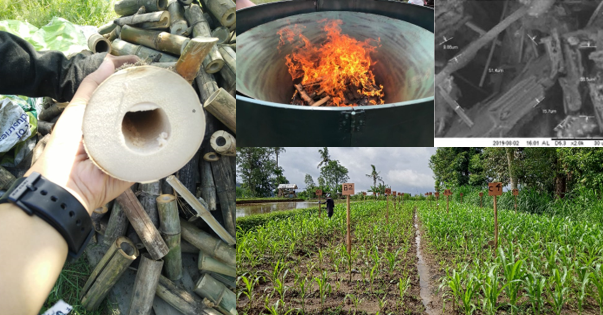Bamboo for biochar: an opportunity for scientific, societal and environmental change in Indonesia (BamBIndo)
VLIR-UOS JOINT project, 2019-2022
Partners: SoFer UGent (coordinator), Gajah Mada University (UGM, Yogyakarta, Indonesia), Syiah Kuala University (UNSYIAH, Banda Aceh, Indonesia), Andalas University (UNAND, Padang, Indonesia), Udayana University (UNAND, Denpasar, Indonesia)
Biochar, the residue that is left after pyrolysis of biomass, is an extremely stable organic matter and can contribute significantly to sustainable carbon sequestration in soils, thus mitigating climate change. Biochars made of woody feedstocks are of highest quality but large scale production of wood biochars may lead to increased pressure on forests. Also, artisanal pyrolysis methods may lead to severe air pollution and accumulation of PAH in the biochar. In this project, we want to address these two issues in the Indonesian context by using bamboo as an alternative feedstock to wood and by producing the biochar using a ‘flame curtain’ (so-called Kon-Tiki) method. Bamboo is plentiful, can be harvested after about 3 years, is used for a variety of purposes, and resprouts readily after harvesting, and is thus a sustainable alternative to wood. Compared to artisanal methods, flame curtain pyrolysis minimizes emissions of fine dust, CO and VOC and largely prevents recondensation of PAH in the resulting biochar, thus minimizing environmental risks during pyrolysis and biochar use. The research will comprise a detailed characterization of biochars from bamboo and other woody and non-woody feedstocks, produced following different pyrolysis technologies (controlled lab pyrolysis, traditional drum method, Kon-Tiki and soil pit methods). The biochars will be compared in 2-year field experiments on farmers’ fields with respect to impact on crop yields, soil properties, C sequestration potential and N2O emissions.
